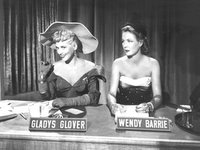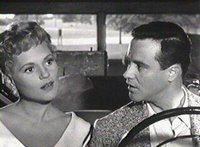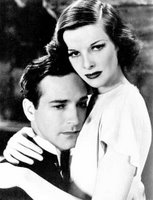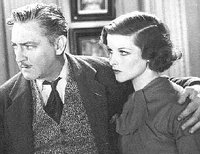 In It Should Happen to You (dir. George Cukor, 1954), Judy Holliday plays Gladys Glover, a woman longing to stand out in the world. [Yes, I'm going to tell you the ending so consider this your spoiler warning.] Fired from her modeling job because her boss made a bad bet about her hip size, she has only the $1000 she has saved up and the drive to make something of herself. In walks Pete Sheppard (Jack Lemmon in his first film), hopeful documentary filmmaker, who finds himself romantically drawn to this woman while claiming not to understand her need for recognition. He recommends, several times in the film, that she enjoy being part of the crowd and stop trying to stand out. He is most baffled by her decision to spend $600 to rent a huge billboard on Columbus Circle for 3 months. On the sign all she puts is her name, in enormous letters. She thoroughly enjoys just looking at the sign, though Pete continues to fret over it, going so far as to refuse to make any real commitment to Gladys until her rental time is up. The sign, we might argue, represents (phallic) power that intimidates Pete.
In It Should Happen to You (dir. George Cukor, 1954), Judy Holliday plays Gladys Glover, a woman longing to stand out in the world. [Yes, I'm going to tell you the ending so consider this your spoiler warning.] Fired from her modeling job because her boss made a bad bet about her hip size, she has only the $1000 she has saved up and the drive to make something of herself. In walks Pete Sheppard (Jack Lemmon in his first film), hopeful documentary filmmaker, who finds himself romantically drawn to this woman while claiming not to understand her need for recognition. He recommends, several times in the film, that she enjoy being part of the crowd and stop trying to stand out. He is most baffled by her decision to spend $600 to rent a huge billboard on Columbus Circle for 3 months. On the sign all she puts is her name, in enormous letters. She thoroughly enjoys just looking at the sign, though Pete continues to fret over it, going so far as to refuse to make any real commitment to Gladys until her rental time is up. The sign, we might argue, represents (phallic) power that intimidates Pete.That Pete is a filmmaker and, thus, wields the gaze, would suggest his need for power: to control the lens through which he and his audience (if anyone actually does see his films, which we don’t actually know) see the world. Why can he not understand what Gladys wants, knowing as he must the implications of his own career choice? Probably because he does not know himself as
 well as she does: he craves attention too, he just gets it less directly than she does, as she soars into appearing on television talk shows, being the Adams’ Soap girl, and having a fighter plane named after her.
well as she does: he craves attention too, he just gets it less directly than she does, as she soars into appearing on television talk shows, being the Adams’ Soap girl, and having a fighter plane named after her. Eventually, of course, the lovers commit to each other, thwarting the playboy antics of Evan Adams III (Peter Lawford) and ending Gladys’s shortlived career…sort of. Pete has been waiting for Gladys’s fame bubble to burst, and a powerful moment over her delicious homecooked dinner happens when she straightforwardly recommends to Pete that he not be the one to burst that bubble himself. He forces her hand when he decides to leave the apartment house where he rents Room 7 while she lives down the hall in Room 9. He makes a short film, ending their relationship, and, in a note, dictates the terms under which she should watch it (turn down the lights, sit, turn on projector, etc.). With his real self unable to control her actions, he uses the medium of film to hold her attention. Does this signify male impotence? The power of the gaze? The need to use mediated methods to control this media-gripped woman? In any case, the trick works, and she faces, through this mediated message, the “fact” that she has been too obsessed with her own image to keep this man. The film fails to critique Pete’s methods, melodramatic background music and Gladys’s tears attesting to the truth that a woman’s success/fame is hollow without a man beside her.
More broadly, the film argues that success/fame is hollow if you don’t “stand for something.” I’m not sure what Pete stands for, but the film seems confident he does. Perhaps the shorthand here is that documentary filmmaking is “real,” which is entertaining to find delivered as a message through a non-documentary film about “unreal” characters. (Of course, we know, all film is artificial, including documentaries, but I can’t quite tell if It Should Happen to You knows this or not.) When Gladys, in stilted prose, finally tells off her manager and ends her life in the limelight, she repeats Pete’s words, and it isn’t just his “stand for something” phrase, it’s five or six lines, verbatim, and though perhaps they are meant to ring true because she now is living them, there are other interpretations available. They ring hollowly because they are not her words, any more than is the ridiculous speech she broke down in the middle of presenting at the airbase where the plane was being named after her. She is mimicking men’s words and maybe we are meant to see both as equally inappropriate, even though Gladys does not seem to get it. She is a puppet of patriarchy, whether via a boyfriend or a PR manager. Women are scripted in romantic comedies and this scene points us to awareness of this. Hence, it is not surprising that her words sound stilted more than self-aware…Holliday does not let her character even pause with the standard “Oh my gosh, he was right” moment as she speaks. We can become aware at this moment that these are not her words but part of the Hollywood norm of women characters being scripted into dulling down their own lives to make room for men.
It is only this rereading that makes palatable a scene that, taken straight, can seem to simply suggest that Gladys has come to her senses and will give up this wild public life for a nice guy she can cook for. Pete is not domineering in traditional ways, giving a whiny opinion but not insisting on anything. He seems more bent on performing masculinity than feeling comfortable in it, which would be pitiful if not for his effect on Gladys. Yet Gladys does speak her mind several times, quite pointedly, yelling at Pete and dumping Mr. Adams III not for making a pass at her but for doing it with so little emotion. I’m not saying her character doesn’t get nasty moments of comeuppance that a feminist perspective eschews, but there are gaps and fissures in the patriarchal armor of this film that are worth exploring.
 And this gets us to the ending, where Gladys gives up a nationwide tour and the rest of her fame for Pete. Yet, as the two drive off together, they see a billboard for sale. Gladys stares at it, Pete freaks out and asks her what she’s staring at (using her gaze to reframe herself once more), and she says “nothing at all” or words to that effect, then lays her head on Pete's shoulder. The threat of her own control of her life and the fact that she (and actress Judy Holliday) shines so much brighter than wimpy Pete (and witty yet very secondary Jack Lemmon) are still present in the film and could re-erupt at any time.
And this gets us to the ending, where Gladys gives up a nationwide tour and the rest of her fame for Pete. Yet, as the two drive off together, they see a billboard for sale. Gladys stares at it, Pete freaks out and asks her what she’s staring at (using her gaze to reframe herself once more), and she says “nothing at all” or words to that effect, then lays her head on Pete's shoulder. The threat of her own control of her life and the fact that she (and actress Judy Holliday) shines so much brighter than wimpy Pete (and witty yet very secondary Jack Lemmon) are still present in the film and could re-erupt at any time.I cannot help but think how sad it is that all that energy “erupted” for such a short time, as Ms. Holliday died of cancer after only a few more films at age 44. Yet you can feel, between Holliday's acting and Cukor's directing, a kind of feminist tension crackling throughout the film.
Note: I just learned that Judy Holliday’s given name was Tuvim and that she was Jewish! Moreover, her career was stunted not only by cancer but also by being brought in for questioning by McCarthy. Though not blacklisted, only a year after she won the Best Actress Oscar for Born Yesterday, this remarkable woman found it difficult to get good film roles. I will definitely need to read up on her relationship with Cukor, who cast her in four films: Adam’s Rib, Born Yesterday, The Marrying Kind, and It Should Happen to You. While I can’t make myself watch The Marrying Kind (yet) because Holliday’s character’s young son drowns in it (too hard to watch with a young son of my own), I have seen the other three and loved her in all of them.










